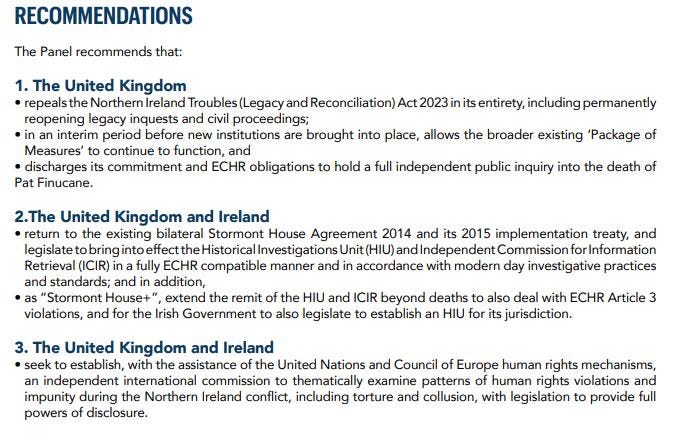 |
Part 3 deals with Investigations, legal proceedings etc and release of prisoners. The Explanatory Notes explain the effect of the legislation.
Part 2 of the Act created an Independent Commission for Reconciliation and Information Recovery (ICRIR) and defined its role and powers.
The effect of Part 3 is to bring into force a conditional immunity scheme, allowing those who cooperate with the ICRIR to receive immunity from prosecution for offences resulting in or connected with Troubles-related deaths and serious injuries. The Act also prevents new Troubles-related civil claims and inquests.
Acting on requests from
the Committee on the Administration of Justice (CAJ) and the Pat Finucane Centre (PFC), the Norwegian Centre for Human Rights has published a document which is highly critical of the legislation - Bitter Legacy: State Impunity in the Northern Ireland Conflict.The report, written by a panel of international human rights experts, has concluded that the British government operated a “widespread, systematic, and systemic” practice of impunity protecting security forces from sanction during the conflict in Northern Ireland.
The report summarises what is known about the conduct of the security forces during the Troubles in three specific areas – state killings, torture and ill-treatment, and collusion – and examines whether the UK government has met its international human rights obligations in these three areas.
At 202 pages, it is a lengthy report. The Panel recommends
:
Legal challenges in Northern Ireland
The 2023 Act has been the subject of legal challenge - see Dillon & Ors, Re Application for Judicial Review (Rev1) [2024] NIKB 11 (28 February 2024) (bailii.org).
A helpful commentary on the case is at Dillon and others’ applications for judicial review – a radically unradical analysis of the Legacy Act - UK Human Rights Blog.
Various provisions of the 2023 Act, mostly relating to immunity from criminal consequences. were found to have breached relevant Convention Rights under the Human Rights Act 1998. The government is appealing the judgment.
Ireland v UK at the European Court of Human Rights
On 17 January 2024 the Government of Ireland lodged an inter-State application against the United Kingdom under Article 33 (inter-State cases) of the European Convention on Human Rights.
The application concerns the 2023 Act and the Irish Government argues that certain provisions of the Act are not compatible with the European Convention. Ireland relies on Articles 2 (right to life), 3 (prohibition of torture and inhuman or degrading treatment), 6 (right to a fair trial), 13 (right to an effective remedy), and 14 (prohibition of discrimination).
In particular, it is claimed that sections 19, 39, 40 and 41 of the Act guarantee immunity from prosecution for Troubles-related offences, provided that certain conditions are met, and that this is contrary to Articles 2 (right to life) and 3 (prohibition of torture and inhuman or degrading treatment) of the Convention.
Further, the application challenges the new REVIEW mechanism which is in the hands of the Independent Commission for Reconciliation and Information Recovery. It is claimed that this is contrary to Articles 2 (right to life), Article 3 (prohibition of torture and inhuman or degrading treatment) and Article 13 (right to an effective remedy).
Section 43 of the Act prevents both the initiation of new Troubles-related civil actions before the courts and the continuation of civil actions not commenced before 17 May 2022. It is claimed that this is contrary to Article 6 (right to a fair trial) read alone and in conjunction with Article 14 of the Convention (prohibition of discrimination).
Media and other information
The UK’s Legacy Act is significant not just for Northern Ireland, but for people everywhere in the world – The Irish Times
Northern Ireland legacy act will harm Britain’s reputation, rights panel warns | Northern Ireland | The Guardian
Addendum 14 May 2024





No comments:
Post a Comment